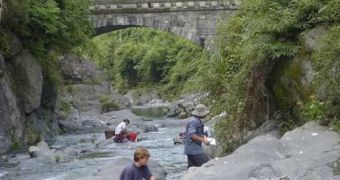According to a new set of investigations conducted by experts at the University of California in Riverside (UCR) in South China, it may be that the earliest animals whose fossils were preserved to this day could have originated in inland lakes, and not necessarily in the open oceans, as previous knowledge had it. Studies of the paleontological records have evidenced the fact that fossils exist in ancient lake deposits, and not in layers of marine sediments, as one would expect if life originated in the open seas, ScienceDaily reports.
“We know that life in the oceans is very different from life in lakes, and, at least in the modern world, the oceans are far more stable and consistent environments compared to lakes which tend to be short-lived features relative to, say, rates of evolution. Thus it is surprising that the first evidence of animals we find is associated with lakes, a far more variable environment than the ocean,” UCR Department of Earth Sciences Geology Professor Martin Kennedy explains the recent finds.
The team focused its efforts on a fossil bed in a South Chinese area known as the Doushantuo Formation, which is known around the world for its almost perfectly preserved fossils, spanning back more than 600 million years. One distinctive trait of this formation is the fact that it does not exhibit any full-scale animals, but rather only bundles of cells. Biologists who analyzed them have inferred that they must be embryos or organisms that populated the area all those years ago, when life on Earth was not very complex, and was reduced to a collection of microorganisms.
“Our first unusual finding in this region was the abundance of a clay mineral called smectite. In rocks of this age, smectite is normally transformed into other types of clay. The smectite in these South China rocks, however, underwent no such transformation and have a special chemistry that, for the smectite to form, requires specific conditions in the water – conditions commonly found in salty, alkaline lakes,” expert Tom Bristow adds. He has been the lead author of a new study detailing the finds, published this week in the journal Proceedings of the National Academy of Sciences (PNAS).
“All our analyses show that the rocks' minerals and geochemistry are not compatible with deposition in seawater. Moreover, we found smectite in only some locations in South China, and not uniformly as one would expect for marine deposits. This was an important indicator that the rocks hosting the fossils were not marine in origin. Taken together, several lines of evidence indicated to us that these early animals lived in a lake environment,” he concludes.

 14 DAY TRIAL //
14 DAY TRIAL //